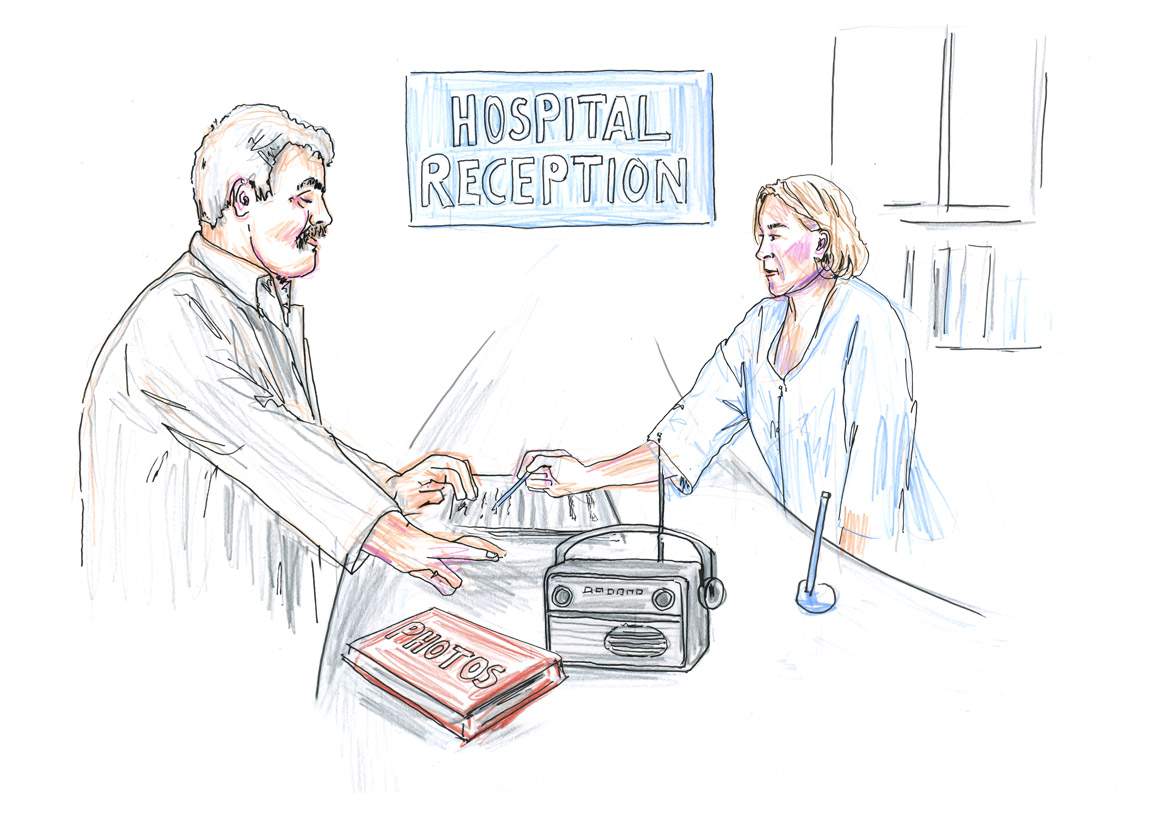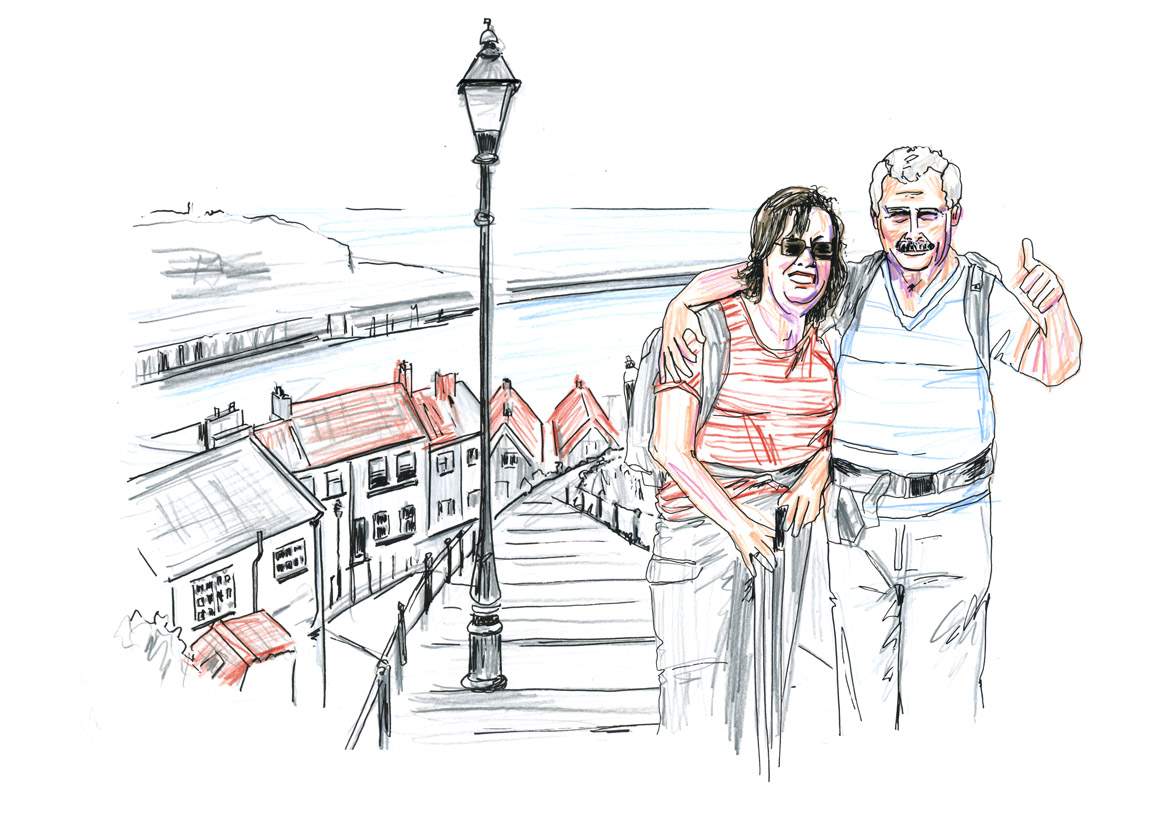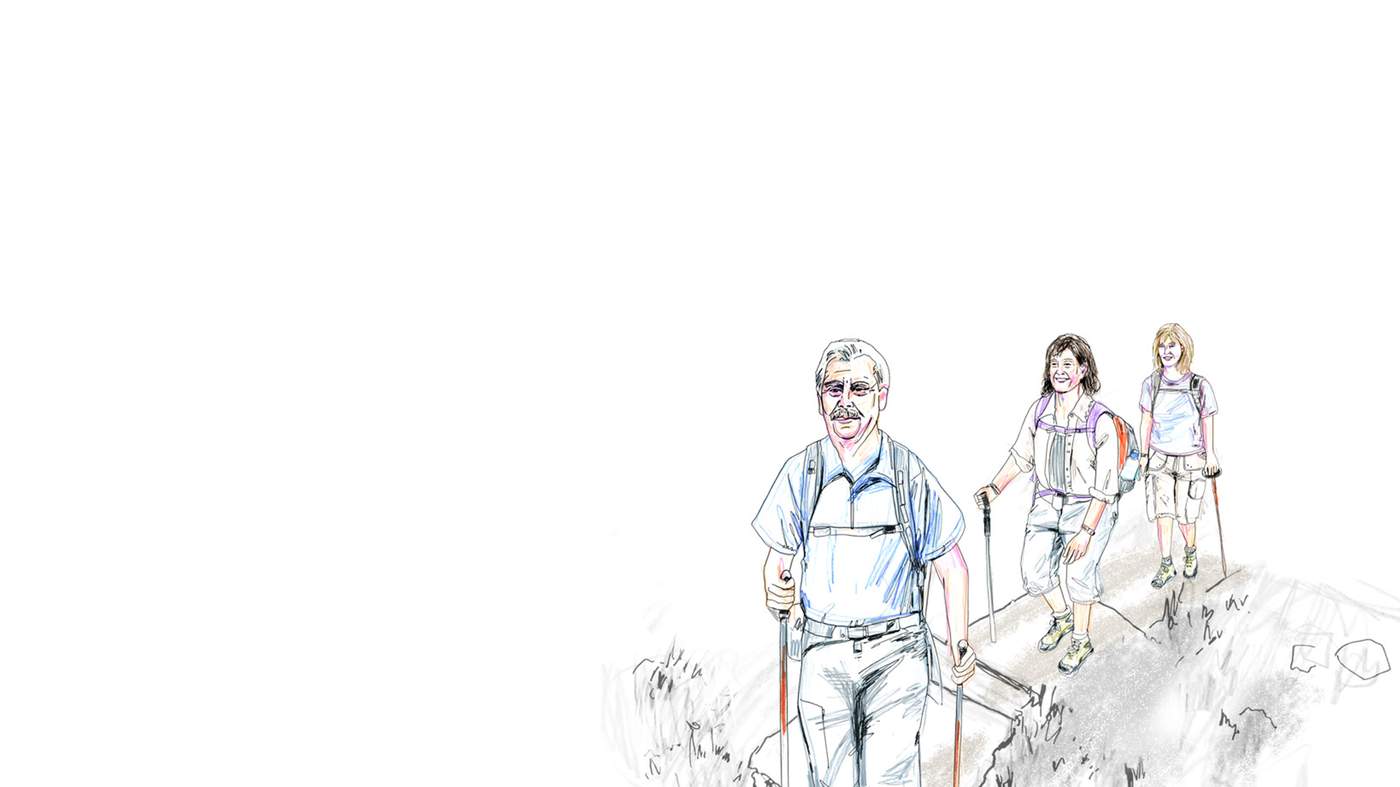2 July 2014
When I was 63 years of age, my wife Bridget and our friend Liz and I set off for an adventure. We were going backpacking for a week across Derbyshire, walking along former railway lines, going from one B&B to another. My health was good and we didn't need to use the number of escape plans, bus rides, taxis and alternatives we had in mind had things gone wrong! I wasn’t a fitness fanatic, but could swim for an hour, cycle about 20 miles and walk up to 15 miles a day. I also led guided history walks around York for visitors.
22 July 2014
But within a period of a few weeks, I developed chest pains when I walked or cycled. This was totally out of the blue, with no warning and no obvious reason. The chest tightened and my body told me I needed to stop and rest. These increased in severity until I could not walk more than a few metres on an upward slope without stopping to recover. I had never been a regular customer of the NHS and so this was a worry. I had asthma as a child, could it be connected?
26 July 2014
A visit to the GP confirmed I had angina and my doctor handed me a glyceryl trinitrate (GTN) spray as a precaution, taking it straight from his desk drawer, as though he had a stock ready for his patients.
I took the news with relief, firstly that I was not rushed off anywhere and secondly because angina seems to be a condition with plenty of support and information. This was combined with a sense of the unknown ahead. It was my regular GP, who didn't display any sign of panic or doom, who helped me absorb it all.
3 August 2014
I was now in the system for an ECG, angiogram and other checks. The details were explained to me, with plenty of printed handouts available. The appointment for an angioplasty was made, and I looked forward to a simple stent being fitted during the procedure, so I could get back to fitness and head off to Derbyshire again.
2 September 2014
The day came. During the procedure I declined to view my own heart on the monitor, preferring to make a close study of the ceiling. (I have always been squeamish, and was banned from giving blood after passing out a couple of times. My wife Bridget has given over 40 pints, so I see it as a joint effort.)
Angioplasty procedure
The outcome of the angioplasty wasn't good. I was told by the doctor that the problem arteries were not easily accessible and my case would be discussed at their next meeting the following Friday. To me this was devastating. I had hoped that a simple stent would do the trick and I would be up and about the next day. At this particular moment I did not know what came next, angina for life?
As I lay down waiting to be discharged a young nurse asked if I wanted a drink, I was too emotional to speak. If she is reading this, I apologise for not replying.
27 September 2014
The confirmation of the outcome of the meeting came after an anxious wait at home, not making any travel plans or organising anything that could have to be cancelled. The conclusion was that I needed a double bypass operation. The surgeon, Mr Mubarak Chaudhry, explained in simple terms what the problem was and what he intended to do. On a positive, he had put it to me that a bypass was more of a risk than angioplasty, but a better option for me for a long term fix. His manner and demeanour during these meetings gave me reassurance and confidence. A true professional!
Then followed another anxious wait for a slot, during which time preparations for being away were made including passing over to my wife some of the tasks I normally performed such as bill payments and putting the bins out.
3 January 2015
The wait for news of the operation date stretched into early January 2015 when finally a date was given. This was a longer wait than I had hoped for, but I didn't want to be treated as a special case or queue jump. The date was Friday the 13th February. Fortunately I am not superstitious and wasn't concerned it was a Friday. I figured that they would have all week to perfect the procedure ready for me. The day came and I put my trust in the team led by the talented Mr (Mubarak) Chaudhry at Hull Castle Hill hospital.
12 February 2015
I reported to Hull ready for the procedure with my radio and personal photographs.

13 February 2015
After regaining consciousness I was visited by Mr Chaudhry who told me that the surgery went well, and he had done a triple bypass. I suppose they might as well do an extra while they were in there!
18 February 2015
I was picked up and taken back home to York, passing the Humber Bridge which I was very pleased to see. I was physically as well as could be expected, but a bit of an emotional wreck, which seems to be common. I was naturally concerned about the future, how my recovery would progress and how life-changing it would all be.
My devoted wife of 40 years was there to help through this period. She was a local girl who I had first met in 1971 and married in 1974. Bridget's understanding, support, loyalty and encouragement have always been part of her character; they would now be needed more than ever before. Her shoulders were there to cry on, literally many times during the first two months.
I found I had to create and print off a chart to help me remember when to take all the medication.
20 February 2015
Together we started the recommended exercises including the all important walking. It was not the best time of year for this, but I was determined to do whatever I could to help the process. We started with 50 metres out, then 50 back, each day progressing a bit further. There were days when no progress was made or even a shorter distance than the day before, this was disappointing, but overall some progress was being made.
28 February 2015
I woke and found I could not stand up, I had totally lost all balance. I panicked a bit using my GTN spray, which I later discovered was pointless in this situation. I thought I may become bedridden. A call to the Hull support line confirmed I needed ambulance transport to hospital, this time York Hospital. I had not seem the inside of an ambulance for over 60 years. It seemed I had atrial fibrillation, which I am later told affects about 50 per cent of cases similar to mine. I’m admitted to a ward where I’ll stay for the next few days.
1 March 2015
The next day in hospital, I get a visitor. It's a woman called Vickie from the York rehab team asking if I want to join their programme, which included weekly gym based exercise sessions. I was feeling very negative about my future, and she was very upbeat and positive. I did wonder how sane she was, especially as she seemed to have a permanent encouraging smile! I asked if I would ever get back to my previous fitness level and she told me there was no reason why not. This gave me hope and a target to aim for.
3 March 2015
I’m released for further recovery at home. My medication chart is now more complex. My emotional state doesn't improve. I now feel I have to start all over again with my recovery. I continue to regularly burst into tears for no obvious reason.
15 March 2015
The first of eight sessions came around, and I was a bit apprehensive. I had concerns about overdoing it, pushing too hard, having a relapse, doing more harm than good. However I told myself that I would be on York Hospital property, surrounded by medical staff. How much safer could I be? The first session dispelled most of my concerns. There were regular checks on your pulse, heart rate (a monitor was attached at all times), blood pressure, and the encouragement to pause to drink plenty of fluids.
The rehab room very much resembled a school gym. There were about a dozen fellow patients, who all had some form of recent heart surgery. Most of them seemed to have a similarly anxious expression, but me especially. There’s no doubt we all had some concern about joining the process, but as time went on it was clear that this would benefit us in the short and the long term.
There were about ten different exercises, designed to give all parts of the body some activity. These included exercise bikes, a treadmill, ball bouncing, steps and weights to name a few. Each period on each exercise was timed, and each exercise was able to be performed at different levels of ability.
The aim was to progress up the levels on each exercise until you reached your most testing level. This could in some cases take the whole programme to achieve. At each session people of varying ages, weights, and general levels of prior fitness attended. Each individual's progress would be different. For my age, I considered my fitness to be average to good.
22 March 2015
The second session. I realised that at each session someone qualified and received a certificate, and someone came for the first time, so there was a turnover. To me it didn't seem to be a place to socialise much; everyone was there for a purpose, to put everything into it and come out the other end in a better position.
5 April 2015
I carried on with the classes, and enjoyed getting a rapport with the staff. The cardiac rehab team were professional, committed, understanding, informative, knowledgeable and a credit to the NHS. It would be unfair to single out any one of them, in fact impossible as each one of them was an indivisible part of the whole. I could now travel there on my own, which itself was a step forward!
26 April 2015
The rehab programme included talks on related aspects of the recovery, diet, stress, exercise, medication etc. One of the presentations was given by a member of the York Coronary Support Trust. This is a 27-year-old charity in York dedicated to supporting those who have had heart events and subsequent procedures. In fact for people like me. They support members with transport for appointments, have social evenings but also have gym-based fitness sessions three days a week. The instructors are suitably qualified, and a specialist nurse is in attendance at some sessions. I really enjoyed the talk and might try out some of the gym sessions.
10 May 2015
Time to get my certificate! The whole cardiac rehab experience was excellent and I highly recommend it. It reduced my anxiety and increased my confidence in my ability to get back to normal life.
The sessions coming to an end created a dilemma for me. What next? How do I maintain my regained fitness level and improve on that to get back to where I was? I had never been a member of a fitness centre or health club; they never appealed. Would they know my particular needs and limitations? Would I overdo it? Who would be there to help me?
15 May 2015
I tried my first exercise session with York Coronary Support Trust. The sessions start with a warm up period followed by a circuit of 12 exercises, using various gym equipment designed to improve fitness in all areas of the body. The process and the equipment is similar to the hospital, allowing the individual to progress up to more difficult levels at their own pace. All levels of fitness and abilities are catered for.
22 May 2015
I try to get to the gym sessions on a weekly basis. I also tried some of the monthly talks, which varied from a presentation by a pilot of the Yorkshire Air Ambulance, to musical evenings, to how to install a real full-size turntable for railway engines!
As well as my fitness, there have been a number of 'return to normal' targets along the way. A first bus journey alone, first car journey alone, first visit to my daughter in London after gaining confidence to go again after a year's gap. I had my first ramble alone and the first time being out of sight of any inhabited buildings. I experienced a natural aversion to being too far from what in my mind I considered to be a safe place, i.e. home.
30 August 2015
I have been on my first walking holiday after recovery. We have taken the decision to find a base rather than backpack between B&Bs with all our belonging on our backs. This was a decision that was inevitable at some point due to age, so is not seen as a backward step, more like sensible progress. The walk was four days around the Whitby area, and started with climbing the 199 stone steps up from the town to Whitby Abbey (the steps mentioned in Dracula). Like most tourists to Whitby, these famous steps are a must do. I have climbed them a number of times before and have always been out of breath at the top, who isn't? This time I was no more out of breath than at any time in the past. This was a significant step (or 199) along the way to recovery.
January 2017
To conclude, I believe I am back to 90-95% of my previous fitness level. That said I am two years older and so would expect some decline in any event. The rehab programme and subsequent activities have not only helped my physical abilities, but also helped to regain my confidence in dealing with problems that life throws up. It has involved meeting new people, doing different things in different places, and generally dealing with life as it comes rather than be concerned about events that I have no control over.

My advice to others
My advice to anyone, no matter what age or ability, would be to aim to return to the fitness level you had before your heart event. Some people will even be able to improve on what they had. If the opportunity arises, join the NHS rehab programme, you could not be in better, safer or more experienced hands. There is no reason to have doubts about joining. If there are no suitable programmes locally use the NHS or other organisations to find suitable exercise regimes. Alternatively speak to your local fitness or health centre and ask if they have programmes for people with heart issues and ask if any of the staff are qualified on the subject. Walking a distance you can cope with is a good start. Exercise at any level will make you feel more upbeat and get you out of the house.
My two-year journey has so far has been a steady upward move towards some normality, but not without one or two difficult and challenging events. I cannot imagine where I would be without the initial practical help given to me by the York rehab team and the springboard it proved to be for the follow-on activities that have helped me so much.
More useful information
• Watch our video to see what cardiac rehab is like
• An expert explains heart bypass surgery
• Read Catherine Mackay’s diary of heart valve surgery
• Get our free booklet on heart disease and your emotional wellbeing





